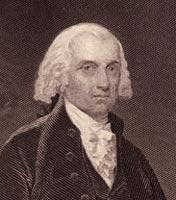War Message to Congress, June 1, 1812
To the Senate and House of Representatives of the United States:
I communicate to Congress certain documents, being a continuation of those heretofore laid before them on the subject of our affairs with Great Britain.
Without going back beyond the renewal in 1803 of the war in which Great Britain is engaged, and omitting unrepaired wrongs of inferior magnitude, the conduct of her Government presents a series of acts hostile to the United States as an independent and neutral nation.
British cruisers have been in the continued practice of violating the American flag on the great highway of nations, and of seizing and carrying off persons sailing under it…. British jurisdiction is thus extended to neutral vessels in a situation where no laws can operate but the law of nations and the laws of the country to which the vessels belong….
…under the pretext of searching for these (British subjects), thousands of American citizens, under the safeguard of public law and of their national flag, have been torn from their country and from everything dear to them; have been dragged on board ships of war of a foreign nation …to risk their lives in the battles of their oppressors….
British cruisers have been in the practice also of violating the rights and the peace of our coasts. They hover over and harass our entering and departing commerce…and have wantonly spilt American blood….
…our commerce has been plundered in every sea, the great staples of our country have been cut off from their legitimate markets, and a destructive blow aimed at our agricultural and maritime interests….
…Great Britain…formally avowed (declared) a determination to persist in them (insults to American maritime rights) against the United States until the markets of her enemy (Britain's enemy, France) should be laid open to British products, thus asserting an obligation on a neutral power (the U.S.) to require one belligerent (combatant in a war) to encourage by its internal regulations the trade of another belligerent
In reviewing the conduct of Great Britain toward the United States our attention is necessarily drawn to the warfare just renewed by the savages (Native Americans) on one of our extensive frontiers - a warfare which is known to spare neither age nor sex and to be distinguished by features peculiarly shocking to humanity. It is difficult to account for…their hostility…without recollecting the authenticated examples of such interpositions (British intrigues with the Indians)….
We behold, in fine, on the side of Great Britain, a state of war against the United States, and on the side of the United States a state of peace toward Great Britain.
Whether the United States shall continue passive (not to take any action)…or, opposing force to force in defense of their national rights, shall commit a just cause into the hands of the Almighty Disposer of Events…is a solemn question which the Constitution wisely confides to the legislative department of the Government. In recommending it to their early deliberations I am happy in the assurance that the decision will be worthy the enlightened and patriotic councils of a virtuous, a free, and a powerful nation.
…the communications last made to Congress on the subject of our relations with France will have shown that since the revocation of her decrees, as they violated the neutral rights of the United States, her Government has authorized illegal captures by its privateers and public ships, and that other outrages have been practiced on our vessels and our citizens…. I abstain (refrain) at this time from recommending to the consideration of Congress definitive measures with respect to that nation (France), in the expectation that the result of …discussions between our minister…at Paris and the French Government will speedily enable Congress to decide with greater advantage on the course due to the rights, the interests, and the honor of our country.





